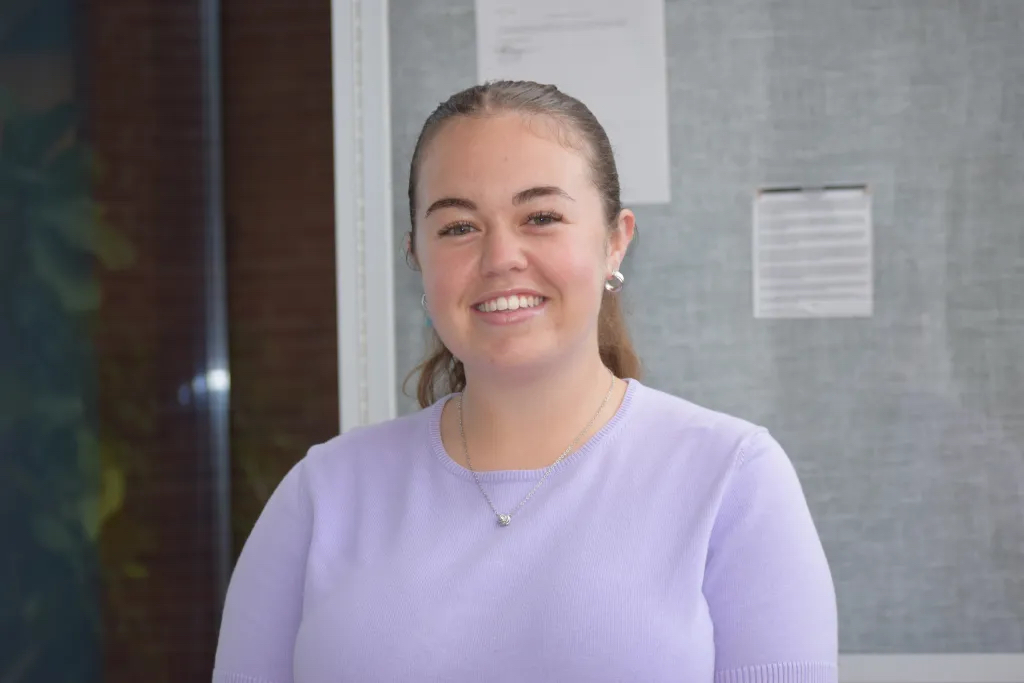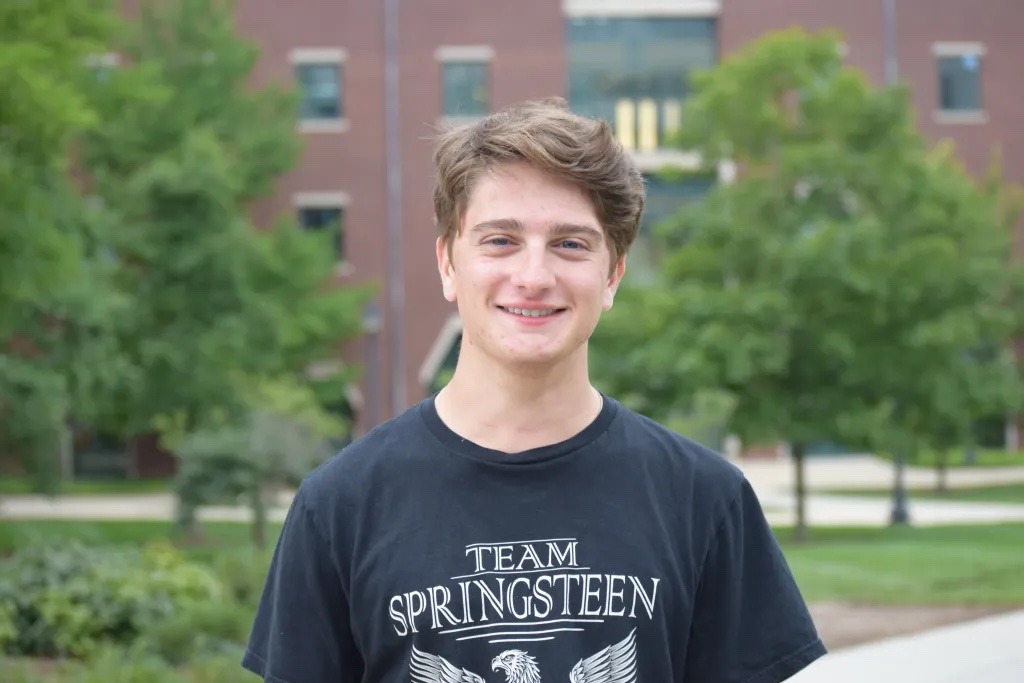
By Bridget Bronsdon | UConn Journalism
September 6, 2024
The University of Connecticut Bookstore will open an early voting site on Oct. 21 in an effort to focus on the age group that has consistently exercised its right to vote the least: young Americans.
Although legislation has stalled that would have established college polling places statewide, negotiations involving the UConn early voting site involved university staff and students as well as Mansfield officials.
Mansfield Mayor Toni Moran said Thursday that town officials were approached by a group of students and some politicians “who wanted to make sure that the students had an opportunity to vote,” so they began speaking with UConn officials. In addition to encouraging the youth vote, the new early voting location on Hillside Road will help the town, she said.
“Our registrars of voters have seen this as an opportunity to release some of the burden of Election Day on them, which can be pretty crazy with people coming in at the last minute to register to vote and to vote,” Moran said.
Students must be registered to vote in Mansfield if they’d like to visit the early voting location, which will be open 10 a.m. to 6 p.m. and will have extended hours from 8 a.m. to 8 p.m. on Oct. 29 and 31. All early voting sites are open until Sunday, Nov. 3.
While officials hope the campus location will encourage students to vote, they stress that the polling place is open to all those registered to vote in Mansfield. The town’s other early voting location is at town hall.
“This allows folks who are registered in Mansfield to be able to just stop in at their convenience and vote,” Mansfield communications specialist Margaret Chatey said. The early voting location will be “a convenience for the staff who live in Mansfield as well as UConn students.”
It’s needed, students say
This marks the first time UConn has hosted a polling location.


“As a college student, it can be really tough to get your vote in,” said Emily Grayson, president of the University of Connecticut College Democrats.
Grayson said the first time she voted as a college student, she had to drive more than an hour home to vote for her local representatives. The lack of polling stations at UConn “made it difficult and I did not want to re-register in Storrs because I wanted to vote for the candidates in my hometown,” she said.
Campus polling stations are helpful for students and could dramatically increase turnout, giving students a way to vote in a nearby location instead of needing “to figure out what to do with an absentee ballot” or traveling hours away, Grayson said.
Nick Lanza, the UConn Student Government director of external affairs, has had an easier experience with casting his ballot in prior elections. Lanza is from Mansfield so he was able to vote in his hometown without any extra challenges.
But Lanza also says of the Mansfield Registrar of Voters office, “it’s kind of difficult, accessibility-wise, to get over there for students,” especially for those who lack transportation.
“If students aren’t going to register to vote until that day, it won’t do anything, it’ll probably make things harder,” Lanza said, as students would have to travel to another location to complete same-day registration.
“It could be beneficial if we get students to register to vote early and that’s a lot of what we’re working on,” he said. “But if there’s not that initiative set up, there’s going to be a thousand students showing up not registered to vote – it may not do very much,” he said.
For now, both Grayson and Lanza said universities can do a better job at advertising absentee ballots and helping students through the process of registering to vote.
Getting out the vote
Even with a record turnout for the 2020 presidential election, just over half – roughly 51 percent – of Americans ages 18–24 voted, census data show. Compare the Gen Z turnout with that of Baby Boomers: 76% of those ages 64–74 voted in 2020.
The reasons for low voter turnout among young people are widely discussed and range from lack of candidate satisfaction to voting accessibility. For those who are college students, accessibility is key. If they wish to vote they must register to vote in their college town, vote absentee or travel home — if that’s even possible, and if they have access to transportation.
In the 2020 presidential election some 46 percent of college students across the nation had a polling place on their campus, according to research from Duke University. But Connecticut has never implemented statewide voting on campus.
A Connecticut House of Representatives bill in 2018 to create campus polling stations was tabled amid concerns that it would cause an administrative nightmare for local registrars and cost towns money for additional poll workers and equipment.
A college town
Fairfield is home to Fairfield University and Sacred Heart University. It has roughly 60,000 residents (including those under 18-years-old and non-citizens), but only 40,000 are registered to vote, leaving a large chunk of its adult population unaccounted for, said Fairfield Democratic Registrar of Voters Matthew Waggner.
He said the town’s unregistered student population living on the campuses is the “missing piece” in the town’s voting population.
While polling stations might be helpful for those on campus who want to vote, not everyone does. Waggner said that college students are “unpredictable” when it comes to voting.
“We can’t really tell when they’re, the students, are going to take an interest. … I’ll say in local elections, the interest is pretty low, and in federal elections, the interest is moderate,” he said.
Last year, however, Fairfield saw a large increase in voter turnout as the students were mobilized by an effort to maintain their beach residency. Waggner said it’s a question of what “from the community enters their awareness that they want to get involved in.”
To combat this issue of low turnout from the college population Waggner said those involved in politics must make it “normal and expected for students to participate.”
“If we assume you’re not going to vote, and all of the campaigns that are participating in the town assume they’re not going to vote, no one’s going to try and engage them. No one’s going to try and make an issue that they’ve taken interest in. No one’s going to try mailing them anything. No one’s going to try to register them to vote,” he added.
Ultimately, Waggner said, low participation among college students becomes “a self-perpetuating cycle.”
Registrars are trying to reach out. They have a voting registration table at new student orientation to answer questions and get students interested. The outcome, however, isn’t always great. Since students are so focused on their new environment, education, relationships and living independently for the first time, it is challenging to “make them aware,” Waggner said.
“Almost everyone walks past,” he said.
Waggner said that while he likes the idea of polling stations on campuses, those outside of campus likely won’t use them, as parking availability and campus navigation “are concerns that you can’t brush off.”
“I want to get more people to vote, but also I work for the voters,” he said.
As for the future of these efforts, there hasn’t been much movement. In 2018, Waggner supported the bill that would have added polling places on campus.
Waggner said he liked the bill because it would encourage students to engage in the town’s civic life and it also catered to residents who didn’t like the idea of voting on campus because the universities would have a separate polling station.
“I hope it does come back,” he said of the initiative.
Despite these efforts, Connecticut is not a part of the five-state collective that either requires or encourages polling stations on campuses, as shown in the National Conference of State Legislatures, and the future of the statewide legislation remains unknown.
This article is part of U.S. Democracy Day, a nationwide collaborative on Sept. 15, the International Day of Democracy, in which news organizations cover how democracy works and the threats it faces. To learn more, visit usdemocracyday.org.
The story was also published by CT Community News, a service of the Connecticut Student Journalism Collaborative, an organization sponsored by journalism departments at college and university campuses across Connecticut and supported by local media partners.
